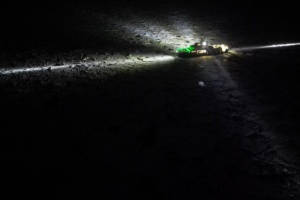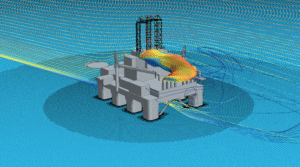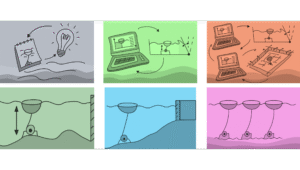Innovative advancement
OceanLab allows full-scale testing and real-world application of technological advancements in Marine Technology. Its valuable data is now being utilised by projects such as Illiad to create a Digital Twin of the Ocean. Whilst societal and geopolitical challenges have recently increased the relevance of the implementation of subsea surveillance systems, this infrastructure now has the potential to push remote environment exploration far beyond the Earth’s horizon.
OceanLab Day
OceanLab Day, held at SeeSalmon on 1st December 2023, celebrated the establishment of the test facilities in the 4 laboratories (subsea robotics and infrastructure, autonomous shipping and ship operations, aquaculture, and marine observations) and the communication and e-infrastructure which knits the laboratories together. Guests gathered to hear a selection of curated talks which journeyed the implementation phase of OceanLab, and node leaders invited new projects, both national and international, to utilise the facility and drive forward innovation.
From OceanLab to FjordLab
OceanLab presents an opportunity to stimulate innovation and a place for collaboration between academia, research and industry. The highly anticipated future extension of the OceanLab to Fjordlab through the addition of Ship Operation Research (as part of Havteknologisenteret) will enable the seamless journey from design and simulation to full-scale testing and verification.
Furthermore, OceanLab has highlighted the capacity for interdisciplinary innovation. Accurate environmental observations (oxygen saturation, salinity, temperature), supported by high-capacity communications networks, underwater autonomous vehicles, autonomous ships and specialised equipment have been shown to improve aquaculture productivity and emphasise the importance of co-creation and cross-collaboration in maximising constructive output from such an ambitious project.
This infrastructure includes Elly, the new electric workboat designed by Skarsvåg Boats and powered by Evoy. She represents a step towards supporting the Norwegian maritime industry to strengthen their global market impact in autonomous shipping. Elly highlights the challenges of enabling the green shift in the blue economy but proves the immense environmental potential of the transition to zero-emission, autonomous shipping.
Collaboration as key to unlocking potential
The OceanLab, funded by The Research Council of Norway and Equinor, allows the development and testing of a multitude of innovative solutions which will pave the way for an increased understanding of the ocean. Now moving to the operational phase, OceanLab is ready for implementation and use by students, researchers, and industry professionals keen to create impactful solutions to environmental and practical challenges.
In a collaboration between SINTEF Ocean and NTNU, OceanLab was created to strengthen the vision behind The Norwegian Ocean Technology Centre (Norsk havteknologisenter), to support specific areas related to national and international strategies – specifically autonomous subsea interventions, autonomous or unmanned maritime transportation, bio-marine production, fish-farming and fisheries, and integrated environmental monitoring and forecasting.
OceanLab is a laboratory for the ocean, in the ocean, and we look forward to inviting you to OceanLab Day 2024!








Comments
No comments yet. Be the first to comment!